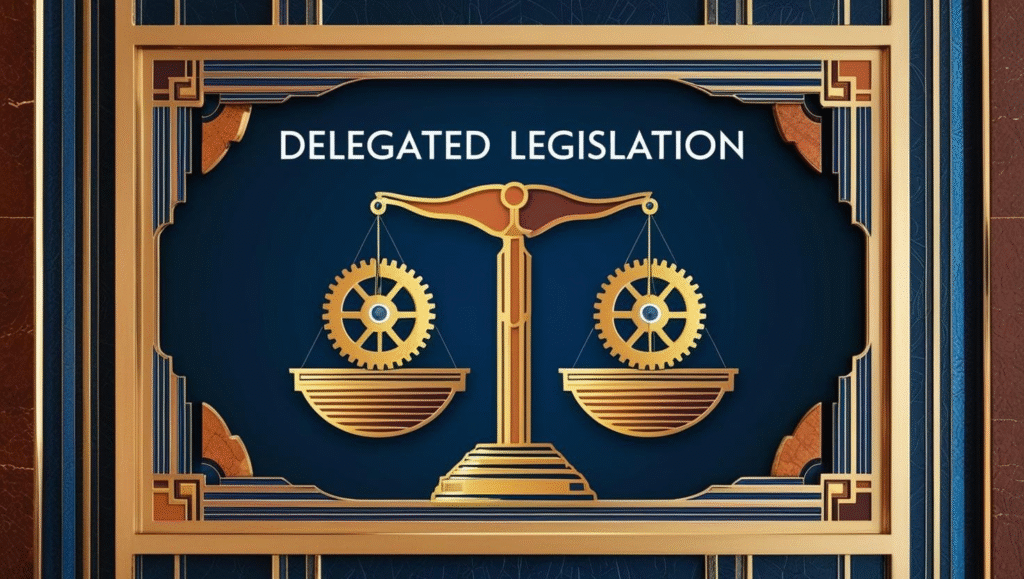
The “delegated legislation” concept has shaped modern democratic systems, and it plays a pretty important role in the development and function of administrative law. It’s an indispensable feature of legislation in an increasingly complex system of governance and administration around the world. In administrative law, it is known as subsidiary or subordinate legislation; provisions of law which are enacted by individuals or organizations who have been empowered by the legislature to establish particularized rules within a particular Act of Parliament. Delegated legislation’s legitimacy comes from the enabling Act that was enacted by the legislature.Delegated legislation, also known as subordinate or secondary legislation, refers to laws made by individuals or bodies authorized by the legislature to create detailed regulations under a specific Act of Parliament.
Delegated legislation derives its authority from an enabling Act passed by the legislature. The Act grants the responsible authority the power to create regulations within the scope defined by the primary legislation.
Delegated Legislation Meaning
Delegated legislation is also referred to as secondary or subordinate legislation. It is a form of law that enables a person or group of people whom an Act of Parliament grants powers to make laws. The persons or bodies could be the government ministers, local authorities, or corporations.
The most outstanding feature of delegated legislation is the passing of law-making powers from the higher authorities, usually the legislative, to the lower authorities. This is done to save legislative time, respond quickly to new developments, and allow for flexibility and expertise.
Black’s Law Dictionary defines ‘Delegation’ as ‘the act of entrusting another with authority or empowering another to act as an agent or representative’.
Delegated legislation is a debatable issue because the Indian democracy is said to have only three organs and those are Legislation, Executive and Judiciary. Moreover, these organs do not interfere on the matters of each other.
But it was necessary to delegate power of legislation to executive to make speedy decisions due to inadequate time legislation has to look in to every minute detail to legislate. It is also called as Secondary legislation,
Subordinate legislation, Ancillary legislation, Administrative legislation, and Quasi-Legislation.
- According to Sir John Salmond, “Subordinate legislation is that which proceeds from any authority other than the sovereign power.”
- According to M.P Jain, this term can be used in two senses:
- Exercise by subordinate agency or agency that is lower in rank to legislature delegated to it by the Legislature.
- The Subsidiary rules made by the Subordinate Authority in the execution of the power bestowed on it by the Legislature.
Reasons for Growth of Delegated Legislation
- Pressure on the time of Parliament: The increasingly expanding field of activities of the state and short time of Parliament makes them susceptible to surrender their law-making power to the executive. The Parliament broadly enunciates the main legislation and leaves details to be filled by the executive or its agents, thus ensuring that the relevant rules and regulations are observed in an effective law.
- Technicality in the matters: Manners have also become super technical due to the complexity of today’s sophisticated society. The legislature requires specialists who have advanced knowledge about specific matters to understand the complex issues related to different topics.
- Flexibility: Delegated legislation provides flexibility and expedites the lawmaking process as it involves the executive branch in regulation, such as police, banking, trade, and foreign exchange. This ensures that unexpected contingencies can be addressed along with efficient management of workload, hence necessary for effective governance.
- Emergency: During the time of emergencies or crisis, action becomes necessary very rapidly, and that is the area where the skills of the legislature can’t be adequate to give swift solutions. Hence, during that time, in such emergencies, delegated legislation gives the executive wider powers to administer emergencies.
- Experiment: Delegated legislation provides the Executive an opportunity to test new laws and evaluate their success. This process allows the experience to be utilized and changes implemented as necessary, based on the application of provisions, keeping in mind the interests and impact on people at the ground level.
- Complexity of modern administration: Modern administration has taken new functions including employment, health, education, and trade regulations. This is something that has resulted in making administration complex. Most authorities required new rules and regulations with the necessary powers the moment the state began to intervene into the sphere of social life and economic administration.
Types of Delegated Legislation
- Orders in Council: These are issued by the Queen and Privy Council usually where the matter at hand is one of national importance.
- Statutory Instruments: This is the most common form of delegated legislation. Usually it is formulated by government ministers.
- By-laws: These are enacted by local authority or some other public corporations applicable to a defined geographical area or sector.
Difference Between Delegated Legislation and Delegated Powers
|
Basis of Differentiation |
Delegated Legislation |
Delegated Powers |
|
Definition |
Process of granting authority to create laws and regulations. |
Powers granted by one branch of government to another to exercise authority and carry out governmental functions. |
|
Purpose |
Allows for detailed implementation and administration of laws. |
Distributes and balances governmental authority for effective governance. |
|
Granting Body |
Legislature |
Legislature |
|
Recipient |
Executive branch or regulatory agencies |
Executive branch or individuals |
|
Examples |
Regulations, bylaws, orders, rules |
Executive orders, appointments, conduct foreign relations, manage administrative agencies |
